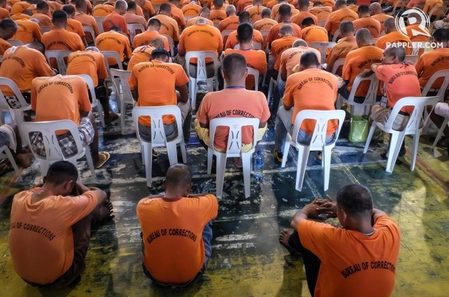SUMMARY
This is AI generated summarization, which may have errors. For context, always refer to the full article.
![[OPINION] Drug arrest and jail and prison congestion: Search for alternatives](https://www.rappler.com/tachyon/2023/12/tl-drugs-prison.jpg)
Drug arrest is the major driver of jail and prison congestion in the Philippines. More than 70% of the Bureau of Jail Management and Penology’s detainee population and Bureau of Corrections’ convicted population are arrested for drug offenses. Based on my ongoing research, around 95% of drug offenders were charged with possessing less than .01 grams of methamphetamine hydrochloride, commonly known as shabu.
The drug arrestees stay in detention for an average of two years while undergoing trial, which forces around 90% of them to plead guilty. When they plead guilty, they are meted a sentence of six months to four years, based on a Supreme Court plea bargaining framework, which made them eligible for probation. However, due to the difficulty in acquiring legal documents for application to probation, such as National Bureau of Investigation (NBI), police, and barangay clearances, the detainees have already served the maximum penalty of the sentences and yet these documents are still pending. Thus, eventually, they withdraw their probation application and, subsequently, they are forced to serve their sentence in full in over-congested jails.
Some of the drug arrestees do not plead guilty and they fight for their innocence in court. However, this can be very risky. Once the courts have proven that they are legally guilty, they can be meted a sentence of life imprisonment. In the Maximum Security Compound in the New Bilibid Prisons alone, of the 19,000 Persons Deprived of Liberty (PDLs) who are confined, more than 8,000 PDLs are serving life sentences for drug possession. This very long sentence imposed on drug users is the most draconian and irrational drug policy in the world. This leads to the congestion of the biggest mega-prison complex in the entire universe.
Research suggests that drug use is a public health issue, not a criminal justice issue. Most of the Filipino drug arrestees are first-time, non-violent, fully functioning individuals. Many of the drug users are employed with supportive, loving families. Many of the drug users used drugs due to negative influences of friends, demands of their work (pampagising), or as a coping strategy for their emotional problems. There is no empirical truth to the image of drug users as zombies who are out there harming everyone else. This propaganda, however, was very effective during the Duterte Administration Drug War, which justified the killings of drug users.
The best approach to the drug problem is rehabilitation. Instead of hauling them to jails and prisons, the police and prosecutors should instead divert them to clinics and rehabilitation centers. First-time, non-violent arrestees should not be put in jail and prisons. They should be provided with medical and therapeutic interventions so they can overcome their drug dependence. Research suggests that when properly supervised and implemented, as shown by the pilot practices in the Parole and Probation Agency Hulagpos Program, drug offenders rarely recidivate.
Our senators and congresspersons should pass a law amending the draconian Republic Act 9165. The maximum penalty for drug use, even for those repeat offenders, should not be more than two years. Two years of stay in residential jail and prison settings will be sufficient to provide intensive treatment that will help them overcome their drug use. The BJMP and the BuCor have shown that they have the capacity to rehabilitate their clients using the Therapeutic Community Modality Program (TCMP). After the two-year incarceration, they should be automatically released on parole supervision for another two years so that they can transition smoothly to the community as responsible citizens.
The Office of the President, his Excellency Ferdinand Marcos Jr. should consider commuting the sentence of individuals given a life sentence to four years of imprisonment. This is aligned with the Supreme Court Circular on the Plea Bargaining agreement where the maximum penalty imposed is four years of imprisonment. Defendants who practiced their right to a full-blown trial should not be penalized with long sentences simply because they did not plead guilty. Releasing them through parole supervision, after their sentence is commuted, will instantly lead to decongestion of the NBP which, despite best efforts, have become criminogenic and violent.
With 70% of the 200,000 detention, jail, and prison population being drug-related offenses, the Philippine government spends billions of pesos. Simple computation of P70 for food and P15 for medicines alone shows that the government spends (P85*200,000*.70*365 days) P4.34 billion a year. This is a waste of precious government funds that could have been used for building schools, hospitals, roads, and bridges.
It is about time that we rationalize our drug laws in the Philippines. It does not make sense that we waste the human resources of our own people. – Rappler.com
Raymund E. Narag, PhD is an Associate Professor in Criminology and Criminal Justice at the School of Justice and Public Safety, Southern Illinois University, Carbondale.
1 comment
How does this make you feel?

![[Rappler Investigates] What’s it all about, Alice?](https://www.rappler.com/tachyon/2024/05/alice-guo-newsletter-may-30-2024.jpg?resize=257%2C257&crop=292px%2C0px%2C720px%2C720px)



The ideas and proposals of Prof. Raymund Narag are highly commendable. The problem with “we rationalize our drug laws in the Philippines” is the Senate where pro-Duterte senators are still in power. Unlike in the House of Representatives, the SMNI hearings have proven that many Duterte loyalists have changed their allegiance to the Marcos-Romualdez Political Dynasty. It will take a long time for Dr. Narag’s ideas and proposals to be realized because the revision of the said drug laws requires that Senators influenced by the Duterte attitude toward drug offenders should be changed first.